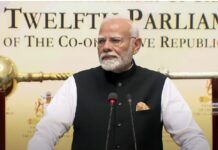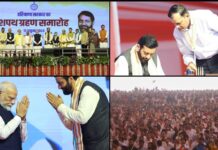Professor J C Anand Memorial Lecture on New Education Policy(NEP) was delivered by Professor Sandeep Shastri, the Vice-Chancellor of Jagran Lakeview University, Bhopal in Panjab University.
While focusing on the higher education components of the NEP document, Shastri referred to the nine goalposts (Navsutra), the government aims to achieve over the next twenty years. These are: inclusiveness, equitability, quality, lifelong learning, flexibility, sensitivity, rootedness, synergy, interdisciplinarity. Presenting an analytical overview of the policy document, Shastri referred to the proposed classification of the higher educational institutions into three categories: research intensive universities, teaching intensive universities and autonomous colleges. The NEP refers to the emphasis on the criticality of reforms in the university system to achieve fiscal prudence, accountability, effective governance and transparency. It also emphasises on encouraging multi-disciplinarity by allowing flexibility in the existing curriculum so that students pursuing higher education may opt for subjects from different disciplines. Introduction of courses in teaching/ pedagogy/ writing related to their chosen research subject during the doctoral training programme is aimed at overall skill enhancement among researchers. The setting up of multidisciplinary education and research universities (MERU) to impart holistic education has been envisaged in the policy document.
The setting up of the National Research Foundation is another step to promote research culture. Introduction of an optional four -year graduation course with the last year focused more on research is another important feature of the NEP, Shastri pointed out.
However, there were some cautionary notes about the NEP in Professor Shastri presentation, mostly regarding its implementation. Drawing attention to the fact that education is a concurrent subject, he observed that in federal India, states have an important role to play in implementing the policy. However, they were not properly consulted in the process of policy making. Consultation was also lacking between the government and the college and university teachers. Like states, teachers are also stakeholders so the absence/lack of consultation made the policy more like a top-down bureaucratic exercise.
Professor Shastri also referred to the proposed setting up of a national higher education regulatory council (HERC) to govern the higher education institutions in place of the existing bodies like UGC. The idea has been to end the fragmentation of higher education system by transforming higher education institutions into multi-disciplinary universities giving importance to all the disciplines including the sciences, social sciences and languages along with the applied disciplines. Shastri cautioned that it should bring about qualitative change in running the government institutions and should not be only a window dressing exercise with the bureaucratic control remaining as firm as ever or worse becoming tighter. Autonomy of the educational institutions is a critical component for the wellbeing of an institution of learning, a point Professor Sinha, DUI also made in his presidential remarks.
Shastri was also sceptical about the abolition of M. Phil. from 2021 itself as he argued that Master degree courses being offered at present do not have courses on research methodology and as such there is a need to revamp the existing curriculum first. Also, the autonomy proposed for the colleges should not mean that they neglect social sciences and languages. Speaking about the difficulty in achieving uniformity in education system across the states in terms of implementation Shastri emphasised on greater understanding of different social, cultural and economic realities in different parts of India. The states may not be willing to go along with the centre as had happened with the NEP, 1986, revised in 1992 until their concerns are addressed through consultation process. This is important that the proposed subject-wise implementation committee of experts in cooperation with other ministries at the centre and state levels should have much broader participation of the teachers and state governments. The committees should not simply be dominated by the higher bureaucracy. Professor Shastri also referred to the increasing gap between state and central universities in terms of funding, infrastructural facilities, availability of teaching faculty, service conditions has created an inbuilt hierarchy in the university system. This also brings into the question of employability levels of the students of different institutions despite all institutions having similar courses and are being regulated by the government.
Professor V R Sinha, DUI in his presidential remarks also drew attention to the funding issue being faced by universities which are critically dependent on the government funding.
















